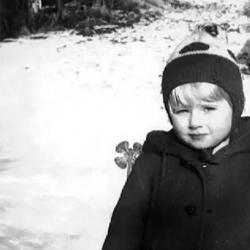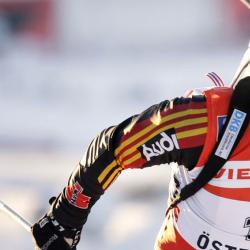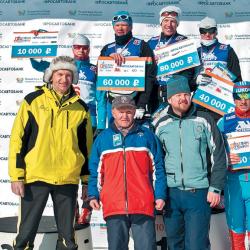Feat of Praskovya dandy
Forgotten dates: 70 years ago: The feat of Voronezh countrywoman Praskovya Ivanovna Shchegoleva September 21st, 2012
 "Don't judge me, Praskovya,
"Don't judge me, Praskovya,
That I came to you like this:
I wanted to drink to your health,
And I must drink to the peace"…
The poet M. Isakovsky dedicated these lines to a courageous and courageous woman.
The description of P. I. Shchegoleva’s feat became the plot of the documentary story “Praskovya” by E. Veltistov.
The name of Praskovya Ivanovna Shchegoleva, who accomplished an unprecedented feat during the war, is written in golden letters in the chronicle of the Great Patriotic War. Praskovya Ivanovna Shchegoleva - above average height, simple face, high cheekbones, brown eyes, straight nose, thick, crescent-shaped eyebrows. The look is attentive, intelligent, and a half-smile lurks in the dimples near the lips. This is how this Russian woman appears to us from one single photograph.
On September 15, 1942, sergeant and pilot of the aviation regiment Mikhail Maltsev received a combat mission: to carry out an attack on enemy equipment accumulated in the forest near the Don River and return to the airfield. While performing this mission, Maltsev's plane was shot down, fell onto a high hill and quickly began to slide on its belly along a steep slope towards the river... right into the garden. Praskovya Shchegoleva was in the garden with her children and mother. She came to her native village of Semiluki, occupied by the Nazis, to dig up potatoes, pick tomatoes and feed the children.
The plane was on fire.
- Mom, give me a shovel! - Praskovya ordered and immediately began to throw earth into the fire with a wide manly swing. Maltsev regained consciousness, stood up and opened the lantern and went down to the ground. A woman ran up to him.
- Go to the house! - she pointed to the house.
-Where are the Germans? - he asked.
- All over the village.
Indeed, secret field police departments settled in the village of Devitsa
and on the Sevastyanovka farm, and field gendarmerie detachments, in addition to these villages, were also located in the Semiluksky state farm, where the headquarters of the 7th German Army Corps was stationed.
And at this time the Nazis with dogs ran to the burning plane.
-Where should I go? Praskovya pointed behind the house.
- Just like that, go down the ravine right now. He crawled. Shchegoleva warned the children not to say anything to the Germans; she herself would answer them. Praskovya did not yet know what awaited her and the children; she did not foresee the end approaching.
As one would expect, a few minutes later the Germans arrived at the crash site. The only son Alexander who escaped from the family spoke about the atrocities of the Nazis (husband and father Stepan Yegorovich died at the front).
The Germans began to interrogate Shchegoleva and the children about the pilot’s hiding place, but none of them gave up the pilot. The woman stood her ground, declaring that she knew nothing. Enraged, the Nazis began to beat Shchegolev and her children and poison them with shepherd dogs, who tore them to shreds. Adults and children were silent. Then the Germans grabbed 12-year-old Sasha, took him to an empty house and, threatening to shoot his mother, tried to get him to tell him where the pilot was hidden. Having achieved nothing, they beat him, saying that everyone would be shot. Returning to the courtyard, they once again carried out brutal reprisals against Praskovya, her mother and five young children: the German extended his hand to the mother, tore Nina off her chest, the blanket opened, and the girl fell to the ground. The dogs were let off their leashes... And then they were all killed:
Praskovya Ivanovna (she was 35 years old), her mother, Anya - 9 years old (her plush jacket was covered like a bullet sieve), Polina - 7 years old, Nina, who was barely two years old. And two Nikolai (son and nephew) 5 - 6 years old.
Sasha got scared when he heard screams and shots. He was sitting in a locked closet. I remembered that there was a narrow hole here. He ran away and hid through it.
The rescued pilot Mikhail Tikhonovich Maltsev took refuge in one of the houses in the village. Semiluki. At night he tried to cross the Don, but failed and had to return to his shelter. The next day, he was accidentally discovered by local residents and later handed over to the occupiers by one of the women.
Maltsev survived captivity and was liberated by Soviet troops in 1945.
Lived and worked in Bashkiria. For labor merits he was awarded the order.
I visited Shchegoleva’s grave in Semiluki several times.
On his first visit, he met in a field and identified the woman who betrayed him to the Germans.
Did Praskovya have a choice? Probably there was. She and the children could have run away
before the Germans arrived and hide, or she might not have approached the burning plane at all, where without her help the pilot would probably have burned. She could have given him away by indicating the direction where he went to hide. Look, for this the Nazis could give the children a chocolate bar or a harmonica, and give her a ration of surrogate products. But Praskovya acted as she did, as her conscience told her. Praskovya Ivanovna Shchegoleva was awarded the Order of the Patriotic War, first degree, Alexander Stepanovich Shchegolev - the medal "For Courage.
In 1967, a monument was unveiled at her burial site.
In September 1942, the Nazis were drawn into the battles for Voronezh, and they received reinforcements through the already captured Semiluki.
There were secret field police departments in the area that terrorized the local Russian population. There was not enough food, and there was a threat of starvation, so people returned to their houses and gardens abandoned during the German attack to harvest. This is what Praskovya Ivanovna Shchegoleva did with her children and mother. On September 22, they returned to their native village to dig up potatoes. Some time after the start of work, they heard the roar of firing anti-aircraft guns and a combat aircraft shot down by the Germans, junior lieutenant of the aviation regiment Mikhail Maltsev, fell under the hill near their garden.
Praskovya, grabbing a shovel, ran up to the plane and began to cover the burning fuselage with earth. The pilot woke up, opened the canopy and descended to the ground. A woman ran up to him and told him to quickly go into the house and change clothes.
When the Germans appeared, the pilot had already hidden in a nearby ravine.
The fascists who arrived first searched the surrounding area, and then, having found nothing, began to interrogate Shchegoleva about the crash and where the pilot had gone. Praskovya answered all questions: “I don’t know anything, I didn’t see anything.” Enraged fascists began to beat Shchegoleva and the children, but did not receive an answer to their questions. Then they grabbed twelve-year-old Sasha, took him to the house, beat him, threatened to shoot his mother, but the boy did not tell them anything. Then they beat him again and locked him in a closet. The Nazis, saying that now everyone would be shot, returned to Praskovya, her mother and young children. The German tried to snatch two-year-old Nina from her mother’s arms, the blanket opened, and the girl fell to the ground. The Nazis unleashed the dogs...
Praskovya Ivanovna was forced to watch how the children and mother were killed, and then they shot her too. On that day, the following died: Praskovya Ivanovna Shchegoleva, her mother Natalya Stepanovna, Anya - nine years old, Polina - seven, Nina, who was barely two years old, two Nikolai (son and nephew) five and six years old. Only Alexander was saved; he made his way through a narrow hole from the closet and ran away.
The next day, Praskovya Ivanovna’s relatives received permission to bury their relatives. What they saw was scary. The house has been looted. The garden has been trampled. The ground in the yard is covered in blood. Shreds of hair and children's clothing were strewn everywhere. They opened the wooden panel of the cellar... Children and women were mutilated, they could not be recognized.
The rescued pilot Mikhail Tikhonovich Maltsev took refuge in one of the houses in the village. Semiluki. At night he tried to cross the Don, but he was unsuccessful and had to return to his shelter. The next day, he was accidentally discovered by local residents and later handed over to the occupiers by one of the women. Maltsev survived captivity and was liberated by Soviet troops in 1945.
Praskovya Ivanovna Shchegoleva was awarded the Order of the Patriotic War, first degree, and her son Alexander Stepanovich Shchegolev was awarded the medal "For Courage".
On the eve of the 60th anniversary of the Victory, a village gathering was held in Semiluki in memory of Praskovya Shchegoleva, who saved a Russian pilot during the war. The participants turned to Metropolitan Sergius of Voronezh and Borisoglebsk with a request to petition the Holy Synod of the Russian Orthodox Church for the canonization of Praskovya as a Saint.
On September 15, 1942, the place where Praskovya Shchegoleva’s house stood became the grave for her, her elderly mother and five children - they were from two to eight years old. They were killed for saving the life of a Soviet pilot.
A unique audio recording of the memories of veteran Mikhail Maltsev, whose attack aircraft was shot down by the Germans and fell on the property of a large family, has been preserved.
Mikhail Maltsev: “The shell hit the engine, seconds, impact, I don’t remember anything. I woke up to someone tugging at my left shoulder.”
It was 35-year-old Praskovya Shchegoleva. She helped the pilot get out of the burning plane and showed him where to hide from the Germans. The Nazis, who could not find the Soviet pilot, began to torture the family. But Praskovya was silent.
Residents learned about the terrible tragedy from the 12-year-old son of Praskovya Shchegoleva, who miraculously survived. The bodies of the mother, grandmother and five children were found the next day in the cellar. They were buried right in the garden, and only after the liberation of the village was a cross installed on the grave.
Film footage has been preserved in which Praskovya Ivanovna’s adult son talks about the last minutes of his family’s life.
Alexander Shchegolev: “It’s hard to even remember how the dogs tore at the children, after which they pulled the dogs away and started asking: “Where is the pilot?” But the children were already lying on the spot, and the mother was lying broken, torn, they began to kick her with a boot and ask where the pilot was. She didn’t answer them.”
Local historian Inna Merkulova recalls with excitement how 20 years after the war, pilot Mikhail Maltsev, who accidentally learned from a newspaper about the martyrdom of the family who saved him, came to Praskovya’s grave, knelt down, then fell to the ground, lay there for a long time and cried. Since then, he and his children often came to Semiluki.
In the regional museum of local lore, a separate exhibition is dedicated to the courageous Praskovya. She was posthumously awarded the Order of the Patriotic War, 1st degree. Poems and stories were written about the feat of the mother of many children, a street in Semiluki was named after her, fellow villagers asked to canonize the selfless countrywoman. And this year we decided to raise funds to create a memorial to Praskovye.
Lyudmila Zdorovtseva, deputy head of the Semiluksky district administration: “This year, September 15, will be the 75th anniversary of the feat of Praskovya Shchegoleva, and we would like to have time to erect a monument by this date.”
About three million rubles are needed for the memorial. Semiluki schoolchildren decided to help raise money; they hold fairs and concerts, and transfer the collected funds to a special account. According to the authors of the memorial, the Praskovya bell will ring in memory of all the heroes and victims of the Great Patriotic War.
On the eve of the 72nd anniversary of the Victory, NTV, Sputnik and Odnoklassniki launched
There is a section in the history of the Great Patriotic War that is little talked about today - the exploits of civilians. Meanwhile, it is precisely these feats that often show how much the Soviet people wanted victory over the enemy. In 1942, victory was still very far away, and 35-year-old resident of the village of Semiluki Praskovya Shchegoleva gave her life and the lives of her five children for it...
...In September 1942, the front line passed through the village of Semiluki. Local residents moved to neighboring Endovishche. This is what 35-year-old Praskovya Shchegoleva and her mother Natalya Stepanovna did. Praskovya had six children - Tanya, Sasha, Anya, Polina, Kolya and Nina. The woman’s husband, tractor driver Stepan Shchegolev, went to the front. Praskovya did not know that he had already died.
On September 14, Praskovya decided that it was not for her family to huddle with strangers and starve. My native garden is nearby, in Semiluki, and the potatoes are just ripe there. A woman with five children (she did not take her eldest daughter), nephew and mother secretly went to her house. They quietly dug up some potatoes, boiled them, ate them, spent the night in their own house...
Rescued pilot
On September 15, 1942, the plane of 21-year-old junior lieutenant Mikhail Maltsev was shot down from the ground by the Germans. The IL-2 fell onto a hill, rolled on its belly along the slope towards the Don and ended up right in Praskovya’s garden.
The plane was on fire. Praskovya, seeing red stars on it, rushed to throw earth at the flame. Mikhail Maltsev lost consciousness and woke up to someone shaking his shoulder. This was one of Praskovya's children.
Praskovya hid the pilot in the house and told him that there were Germans all around. The Nazis with dogs were already running towards the burning plane.
-Where should I go? - asked Mikhail.
“Just like that, go down the ravine,” answered Praskovya.
Torn to shreds...
At first, the German soldiers simply asked where the pilot had gone. Praskovya replied that she saw nothing. The Nazis didn't believe it. Let us quote a certificate from the Voronezh KGB department, which looked into the details of this case: “The Germans took Shchegoleva’s 12-year-old son Alexander, took him to a nearby empty house and, threatening to shoot his mother, tried to find out where the Soviet pilots were. Having failed to achieve this, they beat him. Returning to the courtyard, the Germans committed brutal reprisals against Shchegoleva, her mother and five children. Before shooting them, they set dogs on them, which bit them, tore them to shreds (Shchegoleva’s jaws were knocked out and her breasts were torn off), and then they were all shot.”
Sasha Shchegolev managed to escape. After killing his mother, he secretly escaped from the house through the attic. Later, it was Sasha who spoke about what happened.
Pilot Maltsev took refuge in one of the Semiluk houses. The next day, one of the women discovered him and handed him over to the occupiers. Having survived almost three years of captivity, Mikhail Maltsev was released by Soviet troops in 1945.
Almost a saint
The former pilot got a job as a forester in one of the forest districts of Bashkiria.
“In the 60s, my older sister Tatyana read in Sovetskaya Rossiya about the feat of a woman from Semiluk, who saved a pilot at the cost of her life,” recalls Mikhail Maltsev’s son Vyacheslav Mikhailovich, who was contacted by MY! correspondents. - Tanya then wrote to “Soviet Russia” that this is our dad...
The history of Praskovya Shchegoleva’s feat in Soviet times was pretty much varnished with pretentious speeches, and she is silent about some points. For example, about why the Nazis, who shot a woman and five children for Mikhail Maltsev, left the pilot himself alive. And that Maltsev himself, before the publication of articles in newspapers, did not strive to visit Praskovya’s grave in Semiluki. Perhaps the pilot didn’t know how he would look her family in the eyes...
One way or another, then Mikhail Maltsev and Alexander Shchegolev developed a strong friendship. According to the memoirs of Vyacheslav Maltsev, they called themselves brothers-in-arms and visited each other more than once. On each of his visits, Mikhail Tikhonovich went to Praskovya’s grave. One day he brought several Bashkir birches and planted them on the grave of his savior.
The name of fellow Voronezh residents Praskovya Ivanovna Shchegoleva, who accomplished an unprecedented feat during the war, is written in golden letters in the chronicle of the Great Patriotic War.
There is a section in the history of the Great Patriotic War that is little talked about today - the exploits of civilians. Meanwhile, it is precisely these feats that often show how much the Soviet people wanted victory over the enemy. In 1942, victory was still very far away, and 35-year-old resident of the village of Semiluki Praskovya Shchegoleva gave her life and the lives of her five children for it...
...In September 1942, the front line passed through the village of Semiluki. Local residents moved to neighboring Endovishche. This is what 35-year-old Praskovya Shchegoleva and her mother Natalya Stepanovna did. Praskovya had six children - Tanya, Sasha, Anya, Polina, Kolya and Nina. The woman’s husband, tractor driver Stepan Shchegolev, went to the front. Praskovya did not know that he had already died.
On September 14, Praskovya decided that it was not for her family to huddle with strangers and starve. My native garden is nearby, in Semiluki, and the potatoes are just ripe there. A woman with five children (she did not take her eldest daughter), nephew and mother secretly went to her house. We quietly dug up some potatoes, boiled them, ate them, spent the night in our own house...
Rescued pilot
On September 15, 1942, the plane of 21-year-old junior lieutenant Mikhail Maltsev was shot down from the ground by the Germans. The IL-2 fell onto a hill, rolled on its belly along the slope towards the Don and ended up right in Praskovya’s garden.The plane was on fire. Praskovya, seeing red stars on it, rushed to throw earth at the flame. Mikhail Maltsev lost consciousness and woke up to someone shaking his shoulder. This was one of Praskovya's children.
Praskovya hid the pilot in the house and told him that there were Germans all around. The Nazis with dogs were already running towards the burning plane.
-Where should I go? - asked Mikhail.
“Just like that, go down the ravine,” answered Praskovya.
Torn to shreds...
At first, the German soldiers simply asked where the pilot had gone. Praskovya replied that she saw nothing. The Nazis didn't believe it. Let us quote a certificate from the Voronezh KGB department, which looked into the details of this case: “The Germans took Shchegoleva’s 12-year-old son Alexander, took him to a nearby empty house and, threatening to shoot his mother, tried to find out where the Soviet pilots were. Having failed to achieve this, they beat him. Returning to the courtyard, the Germans carried out brutal reprisals against Shchegoleva, her mother and five children. Before shooting them, they set dogs on them, which bit them, tore them to shreds (Shchegoleva’s jaws were knocked out and her breasts were torn off), and then they were all shot.”Sasha Shchegolev managed to escape. After killing his mother, he secretly escaped from the house through the attic. Later, it was Sasha who spoke about what happened.
Pilot Maltsev took refuge in one of the Semiluk houses. The next day, one of the women discovered him and handed him over to the occupiers. Having survived almost three years of captivity, Mikhail Maltsev was released by Soviet troops in 1945.
Almost a saint
The former pilot got a job as a forester in one of the forest districts of Bashkiria.“In the 60s, my older sister Tatyana read in “Soviet Russia” about the feat of a woman from Semiluk, who saved a pilot at the cost of her life,” recalls Mikhail Maltsev’s son Vyacheslav Mikhailovich, who was contacted by “MY!” correspondents. - Tanya then wrote to “Soviet Russia” that this is our dad...
The history of Praskovya Shchegoleva’s feat in Soviet times was pretty much varnished with pretentious speeches, and she is silent about some points. For example, about why the Nazis, who shot a woman and five children for Mikhail Maltsev, left the pilot himself alive. And that Maltsev himself, before the publication of articles in newspapers, did not strive to visit Praskovya’s grave in Semiluki. Perhaps the pilot didn’t know how he would look her family in the eyes...
One way or another, then Mikhail Maltsev and Alexander Shchegolev developed a strong friendship. According to the memoirs of Vyacheslav Maltsev, they called themselves brothers-in-arms and visited each other more than once. On each of his visits, Mikhail Tikhonovich went to Praskovya’s grave. One day he brought several Bashkir birches and planted them on the grave of his savior.

 4.
4.






